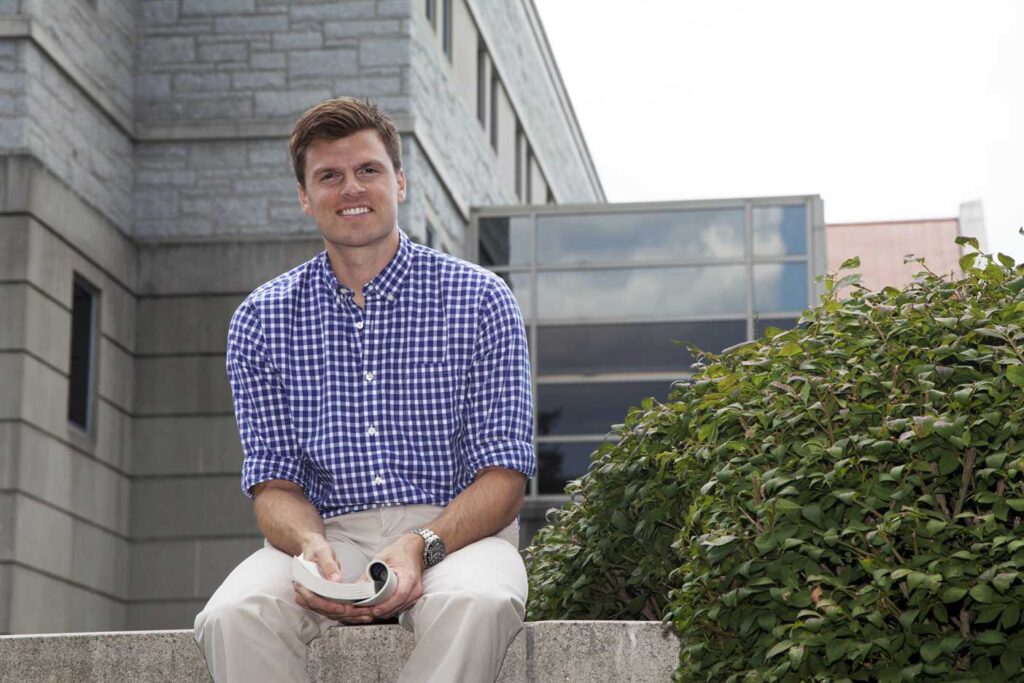
 “Once I realized that all of human behavior, and the way we experience the world, happens in the brain, I was hooked!” says Jesse Main, Psy.D., of Lancaster, Pa.
“Once I realized that all of human behavior, and the way we experience the world, happens in the brain, I was hooked!” says Jesse Main, Psy.D., of Lancaster, Pa.
Early in his time in Immaculata University’s doctoral program in clinical psychology, Main, who will participate in commencement exercises this Friday, took a class in biological bases of behavior with IU psychology professor Marie McGrath, Ph.D. Main had planned to become a general psychology practitioner, but this class with McGrath changed the trajectory of his career.
“She really shaped my idea of cognitive testing and all things brain and behavior and introduced me to this world I never knew existed,” Main says.
He references the case of Phineas Gage, a railroad worker whose frontal lobe was damaged when an iron rod shot through his head. Though Gage survived, his personality reportedly changed dramatically, giving scientists some insight into the ways different regions of the brain affect decision-making and cognition. Fascinated by case studies such as this one, Main decided to specialize in neuropsychology to learn more about how brain function impacts behavior.
Main is completing an internship in neuropsychology and behavioral medicine at Penn Medicine Lancaster General Health Physicians Neuropsychology and will begin a postdoctoral fellowship there in August.
“He has been a very strong student over the years, very proactive in his training, and his current internship supervisors have indicated that he is one of the strongest trainees they’ve ever had,” says McGrath, who chaired Main’s dissertation committee.
At Lancaster General, Main works with patients with acquired brain injuries, predominantly those who have some form of dementia. He provides neuropsychological assessments that examine memory, concentration, problem-solving, visual and verbal skills and personality measures.
Main balances this highly technical work with a compassionate understanding of the human side of complex neuropsychological issues.
He understands that when patients and family members first hear about an Alzheimer’s diagnosis, they often feel afraid. He works to provide comprehensive information without overwhelming families. He teaches patients and families compensatory strategies for remembering things.
“You’re much more likely to remember something if you think about it as opposed to just hearing it passively,” he says. He recommends “multimodal encoding”—combining hearing, sight, and speech to help process and retain information.
Medications may slow the progression of the disease, but not always. “Since there are no disease-altering drugs, the idea is to help them be as highly functioning as possible for as long as possible,” Main says.
He encourages families to attend support groups. He remembers evaluating a woman who had mid-stage Alzheimer’s and making recommendations for her and her husband. A couple of months later, Main spoke about caregiver guilt at a support group that the husband attended. The caregivers in the group shared personal stories and validated each other’s experiences. Main noticed that the husband became tearful during the meeting, so he approached the man afterward and asked him how he was.
“There are people behind this who are really, really struggling,” Main reflects. “When you see a case from the very beginning all the way through your recommendations … and you see that you’re helping them—it’s really powerful.”
Main intends to use his clinical research to help patients as well. For his dissertation, he studied the clinical value of using a new neuropsychological assessment, the Road Sign Perception Test, in a geriatric population. Designed by neuropsychologist Paul Green, the test evaluates visual working memory—test-takers see road signs flash quickly on a screen and have to select which ones they saw. The assessment is intended to measure cognitive decline and inform health care providers about a patient’s ability to operate a motor vehicle safely.
Main’s dissertation is the first study to examine whether the test could be used as part of a neuropsychological test battery to help screen geriatric patients for neurocognitive disorders. Main found a significant difference in the test scores of the control group versus the group that had been diagnosed with a major neurocognitive disorder. During his postdoctoral fellowship, Main plans to gather more data to see if the test could detect mild neurocognitive disorders. He sent his dissertation to Green, who encouraged him to publish it.
Main ultimately views his doctoral training and his research as a means to help his patients. After earning a master’s in counseling, he worked for a few years as a psychotherapist.
“I was only able to take patients as far as my training would allow me, and I knew that there was this higher level of training out there, a doctorate, that would enable me to help people more, to help them explore who they were, and what was the basis of their struggles more,” he says. “I thought, ‘Well, if I can do that, why wouldn’t I?’ It would be a disservice to those people if I didn’t try as best I could to help them as much as possible.”
Reflecting on his experience in Immaculata’s doctor of psychology program, Main says it allowed him and his classmates to dive into their interests whole-heartedly, all while becoming well-rounded psychologists.
“The faculty, from beginning to end, are supportive and approachable, incredibly talented practitioners and just good human beings to be around,” he says, laughing, “which is important!”
On the practical level, evening classes and the tuition remission Main received by doing an assistantship made doctoral studies possible for him. Two of his three children were born while he was in the program. He mentions the support network that he and his wife, a family physician, have, especially the support of his mother-in-law.
“The program was designed in a way that I could reach for my professional goals and still have my family,” he says.